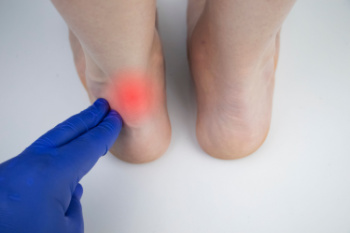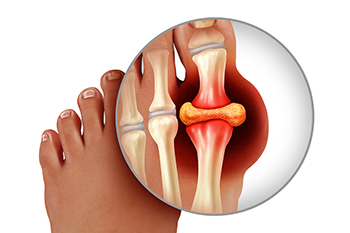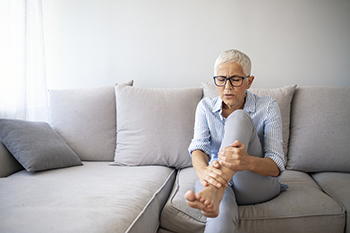Connect With Us
Blog
Items filtered by date: September 2024
Achilles Pain From Achilles Tendinopathy

Achilles tendinopathy, or Achilles pain, is common among athletes, particularly in sports involving running, jumping, and sudden changes in direction. It occurs when the Achilles tendon becomes overworked due to repetitive strain, often from overtraining, poor technique, or wearing inadequate footwear. Athletes in sports like basketball, soccer, or track and field are especially prone. Symptoms include stiffness and pain along the back of the heel, particularly after physical activity or intense workouts. Ignoring these symptoms can lead to chronic pain or even a tendon rupture, sidelining athletes for extended periods of time. Diagnosis typically involves a physical examination and sometimes imaging like ultrasound or MRI scans to determine the severity. Treatment focuses on rest. For prevention, athletes should engage in proper warm-up, cooldown routines, and wearing the right footwear. If you engage in sports and have incurred an Achilles tendon injury, it is suggested that you visit a podiatrist for a proper diagnosis and care.
Ankle and foot injuries are common among athletes and in many sports. They can be caused by several problems and may be potentially serious. If you are feeling pain or think you were injured in a sporting event or when exercising, consult with one of our podiatrists from Cleveland Foot & Ankle Clinic. Our doctors will assess your condition and provide you with quality foot and ankle treatment.
Common Injuries
The most common injuries that occur in sporting activities include:
- Achilles Tendonitis
- Achilles Tendon Rupture
- Ankle Sprains
- Broken Foot
- Plantar Fasciitis
- Stress Fractures
- Turf Toe
Symptoms
Symptoms vary depending upon the injury and in some cases, there may be no symptoms at all. However, in most cases, some form of symptom is experienced. Pain, aching, burning, bruising, tenderness, tightness or stiffness, sensation loss, difficulty moving, and swelling are the most common symptoms.
Treatment
Just as symptoms vary depending upon the injury, so do treatment options. A common treatment method is known as the RICE method. This method involves rest, applying ice, compression and elevating the afflicted foot or ankle. If the injury appears to be more serious, surgery might be required, such as arthroscopic or reconstructive surgery. Lastly, rehabilitation or therapy might be needed to gain full functionality in the afflicted area. Any discomfort experienced by an athlete must be evaluated by a licensed, reputable medical professional.
If you have any questions, please feel free to contact our offices located in Cleveland, Independence, and Kent, OH . We offer the newest diagnostic and treatment technologies for all your foot care needs.
Are You Suffering From Nerve Damage?
What Is Gout?

Gout is a type of arthritis caused by the accumulation of uric acid crystals in the joints, leading to sudden, severe pain and inflammation. It commonly affects the big toe but can impact other joints as well. Early symptoms of gout include intense pain, swelling, redness, and warmth in the affected joint, often starting abruptly at night. If left untreated, gout can lead to chronic joint damage, kidney stones, and decreased mobility. Certain factors increase the risk of developing gout, such as a high-purine diet, obesity, and genetic predisposition. Diagnosis typically involves a combination of medical history, physical examination, and laboratory tests to measure uric acid levels and confirm crystal presence through joint fluid analysis or imaging. Managing gout effectively can require medication and lifestyle changes. If you experience persistent big toe pain from gout, it is suggested you schedule an appointment with a podiatrist for a thorough diagnosis and personalized treatment plan.
Gout is a painful condition that can be treated. If you are seeking treatment, contact one of our podiatrists from Cleveland Foot & Ankle Clinic. Our doctors will treat your foot and ankle needs.
What Is Gout?
Gout is a form of arthritis that is characterized by sudden, severe attacks of pain, redness, and tenderness in the joints. The condition usually affects the joint at the base of the big toe. A gout attack can occur at any random time, such as the middle of the night while you are asleep.
Symptoms
- Intense Joint Pain - Usually around the large joint of your big toe, and it most severe within the first four to twelve hours
- Lingering Discomfort - Joint discomfort may last from a few days to a few weeks
- Inflammation and Redness -Affected joints may become swollen, tender, warm and red
- Limited Range of Motion - May experience a decrease in joint mobility
Risk Factors
- Genetics - If family members have gout, you’re more likely to have it
- Medications - Diuretic medications can raise uric acid levels
- Gender/Age - Gout is more common in men until the age of 60. It is believed that estrogen protects women until that point
- Diet - Eating red meat and shellfish increases your risk
- Alcohol - Having more than two alcoholic drinks per day increases your risk
- Obesity - Obese people are at a higher risk for gout
Prior to visiting your podiatrist to receive treatment for gout, there are a few things you should do beforehand. If you have gout you should write down your symptoms--including when they started and how often you experience them, important medical information you may have, and any questions you may have. Writing down these three things will help your podiatrist in assessing your specific situation so that he or she may provide the best route of treatment for you.
If you have any questions, please feel free to contact our offices located in Cleveland, Independence, and Kent, OH . We offer the newest diagnostic and treatment technologies for all your foot care needs.
The Do’s and Don’ts of Diabetic Foot Care

Diabetic foot care is crucial for avoiding complications and maintaining foot health. Do regularly inspect your feet for cuts, blisters, or changes in skin color, as diabetes can impair sensation and delay healing. Clean your feet daily with mild soap and water, and keep them dry, especially between the toes, to prevent infections. Always wear well-fitting, supportive shoes to avoid blisters and sores. Regular visits to a podiatrist can help detect potential issues early. Do not walk barefoot, as this increases the risk of injury and infection. Avoid using hot water bottles or heating pads on your feet, as reduced sensation can lead to burns. Do not self-treat or attempt to cut corns or calluses, as this can cause injury. If you have diabetes, it is suggested that you regularly visit a podiatrist who can help you to manage this condition.
Diabetic foot care is important in preventing foot ailments such as ulcers. If you are suffering from diabetes or have any other concerns about your feet, contact one of our podiatrists from Cleveland Foot & Ankle Clinic. Our doctors can provide the care you need to keep you pain-free and on your feet.
Diabetic Foot Care
Diabetes affects millions of people every year. The condition can damage blood vessels in many parts of the body, especially the feet. Because of this, taking care of your feet is essential if you have diabetes, and having a podiatrist help monitor your foot health is highly recommended.
The Importance of Caring for Your Feet
- Routinely inspect your feet for bruises or sores.
- Wear socks that fit your feet comfortably.
- Wear comfortable shoes that provide adequate support.
Patients with diabetes should have their doctor monitor their blood levels, as blood sugar levels play such a huge role in diabetic care. Monitoring these levels on a regular basis is highly advised.
It is always best to inform your healthcare professional of any concerns you may have regarding your feet, especially for diabetic patients. Early treatment and routine foot examinations are keys to maintaining proper health, especially because severe complications can arise if proper treatment is not applied.
If you have any questions please feel free to contact our offices located in Cleveland, Independence, and Kent, OH . We offer the newest diagnostic and treatment technologies for all your foot and ankle needs.
Arthritis and the Feet

Arthritis is a condition characterized by inflammation of the joints, leading to pain, stiffness, and swelling. There are several types of arthritis, the most common being osteoarthritis, which results from wear and tear of the joints over time, and rheumatoid arthritis, an autoimmune disorder where the immune system attacks the joints. Other types include gout, which occurs due to uric acid buildup, and psoriatic arthritis, associated with the skin condition psoriasis. Arthritis can significantly affect the feet, causing pain and limiting mobility. Symptoms include joint pain, stiffness, swelling, and a reduced range of motion, often worsening with activity or after periods of inactivity. The feet can be particularly vulnerable, as they bear the body's weight, making walking and standing painful. If you have painful arthritis that is impacting your feet, it is suggested that you schedule an appointment with a podiatrist for advice on alleviating symptoms and managing the condition.
Arthritis can be a difficult condition to live with. If you are seeking treatment, contact one of our podiatrists from Cleveland Foot & Ankle Clinic. Our doctors can provide the care you need to keep you pain-free and on your feet.
Arthritic Foot Care
Arthritis is a term that is commonly used to describe joint pain. The condition itself can occur to anyone of any age, race, or gender, and there are over 100 types of it. Nevertheless, arthritis is more commonly found in women compared to men, and it is also more prevalent in those who are overweight. The causes of arthritis vary depending on which type of arthritis you have. Osteoarthritis for example, is often caused by injury, while rheumatoid arthritis is caused by a misdirected immune system.
Symptoms
- Swelling
- Pain
- Stiffness
- Decreased Range of Motion
Arthritic symptoms range in severity, and they may come and go. Some symptoms stay the same for several years but could potentially get worse with time. Severe cases of arthritis can prevent its sufferers from performing daily activities and make walking difficult.
Risk Factors
- Occupation – Occupations requiring repetitive knee movements have been linked to osteoarthritis
- Obesity – Excess weight can contribute to osteoarthritis development
- Infection – Microbial agents can infect the joints and trigger arthritis
- Joint Injuries – Damage to joints may lead to osteoarthritis
- Age – Risk increases with age
- Gender –Most types are more common in women
- Genetics – Arthritis can be hereditary
If you suspect your arthritis is affecting your feet, it is crucial that you see a podiatrist immediately. Your doctor will be able to address your specific case and help you decide which treatment method is best for you.
If you have any questions, please feel free to contact our offices located in Cleveland, Independence, and Kent, OH . We offer the newest diagnostic and treatment technologies for all your foot care needs.
Blog Archives
- March 2025
- February 2025
- January 2025
- December 2024
- November 2024
- October 2024
- September 2024
- August 2024
- July 2024
- June 2024
- May 2024
- April 2024
- March 2024
- February 2024
- January 2024
- December 2023
- November 2023
- October 2023
- September 2023
- August 2023
- July 2023
- June 2023
- May 2023
- April 2023
- March 2023
- February 2023
- January 2023
- December 2022
- November 2022
- October 2022
- September 2022
- August 2022
- July 2022
- June 2022
- May 2022
- April 2022
- March 2022

